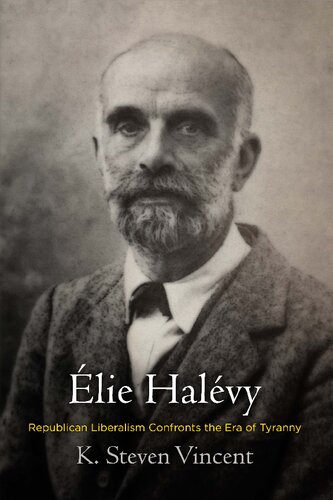

Most ebook files are in PDF format, so you can easily read them using various software such as Foxit Reader or directly on the Google Chrome browser.
Some ebook files are released by publishers in other formats such as .awz, .mobi, .epub, .fb2, etc. You may need to install specific software to read these formats on mobile/PC, such as Calibre.
Please read the tutorial at this link: https://ebookbell.com/faq
We offer FREE conversion to the popular formats you request; however, this may take some time. Therefore, right after payment, please email us, and we will try to provide the service as quickly as possible.
For some exceptional file formats or broken links (if any), please refrain from opening any disputes. Instead, email us first, and we will try to assist within a maximum of 6 hours.
EbookBell Team

4.4
62 reviewsAn intellectual biography of the renowned and influential observer of the "era of tyrannies"
Élie Halévy (1870-1937) was one of the most respected and influential intellectuals of the French Third Republic. In this densely contextualized biography, K. Steven Vincent describes how Halévy, best remembered as the historian of British Utilitarianism and nineteenth-century English history, was also a persistent, acute, and increasingly anxious observer of society in a period defined by industrialization and imperialism and by what Halévy famously called the "era of tyrannies."
Vincent distinguishes three broad phases in the development of Halévy's thought. In the first, Halévy brought his version of neo-Kantianism to debates with sociologists and philosophers and to his study of English Utilitarianism. He forged ties with Xavier Léon, Léon Brunschvicg, and Alain (Émile-Auguste Chartier), life-long intellectual interlocutors. Together they founded the Revue de métaphysique et de morale, a continuing venue for Halévy's reflections. The Dreyfus Affair, Vincent argues, caused Halévy to shift his focus from philosophy to history and from metaphysics to politics. He became a philosopher-historian, less interested in abstract neo-Kantianism and more in real-world action, less given to rarified debates over truth and more to investigation of how theories and their applications were situated within broader political, economic, and cultural movements. World War I and its destabilizing effects provoked the third phase, Vincent explains. As he watched reason recede before rabid nationalism and a pox of political enthusiasms, Halévy sounded the alarm about liberal democracy's vulnerabilities.
Vincent situates Halévy on the unsteady and narrowing middle ground between state socialism and fascism, showing how he defended liberalism while, at the same time, appreciating socialists' analyses of capitalism's negative impact and their calls for reform and greater economic equality. Through his analysis of Halévy's life and works, Vincent illuminates the complexity of the Third Republic's philosophical, historical, and political thought and concludes with an incisive summary of the distinctive nature of French liberalism.